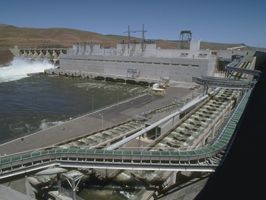forum
library
tutorial
contact

Congress Must Take Control
of Federal Dam Policy
by Editorial Board
Walla Walla Union-Bulletin, April 8, 2018
|
the film forum library tutorial contact |

|
Congress Must Take Control
by Editorial Board
|
A judge's ruling mandates more water be spilled over Snake and Columbia river dams
 United States District Court Judge Michael Simon might be well versed in law, but he isn't an expert on hydroelectric dams or fish science.
United States District Court Judge Michael Simon might be well versed in law, but he isn't an expert on hydroelectric dams or fish science.
Yet, his 2017 ruling -- which was allowed to take effect last week after a higher court rejected an appeal -- mandates more water must be spilled over Snake and Columbia rivers in what the judge believes will help young salmon migrating to the Pacific Ocean.
A judge should not have this authority to set policy. That is the role of Congress.
Beyond that, this move has the potential to actually hurt salmon and will cost the users of electricity in the Pacific Northwest (all of us) $40 million over the next few months.
Many scientists contend spilling too much water creates high gas levels in the water that can harm juvenile fish. When the water is poured over the dam rather than the turbines, less power is generated. The added spill could also negatively impact irrigation and barging commodities -- including wheat -- down the rivers.
Simon seems to be narrowly focused on spilling more water over the dams, regardless of the merits, as well as wanting to breach the dams. The later idea is just plain foolish.
The only positive is that the increased spill rate over the dams could light a fire under Congress to take action.
Last year, the U.S. Department of Interior tossed its support behind the goals of legislation proposed by U.S. Rep. Cathy McMorris Rodgers, R-Spokane; U.S. Rep. Dan Newhouse, R-Sunnyside; and others to protect the dams from Simon's overzealous ruling.
The proposal would keep in place the Federal Columbia River Biological Opinion, often referred to as BiOp, until 2022. BiOp is the plan created by a collaboration of federal agencies, states and tribes to protect salmon while continuing to operate dams for hydropower.
Simon doesn't believe the BiOp does enough to protect salmon.
The Legislation, HR 3144, would keep the status quo on the Snake and Columbia river dams until 2022, with no court-ordered change to operation.
The effort to breach dams must be curtailed. This has already been studied and studied. It's clear tearing down the four Snake River dams would be a disaster for the Pacific Northwest. The water from a free-flowing Snake would create flooding and end shipping grains and goods on the rivers. It would add truck traffic, raise costs and boost air pollution.
Last week, U.S. Sen. Patty Murray, D-Wash., clarified her position on the issue after there was some confusion when she called for an environmental study of the issue. She was asked by an audience member at a meeting in Pasco recently whether she would take a stand against breaching Ice Harbor Dam (in Walla Walla County) and other Snake River dams.
"Absolutely," she said, "I did not call for, nor would I call for, the removal of the Snake River dams."
Allowing a judge's ruling to usurp federal control of the dams is bad public policy. Allowing Congress to establish control and work within the agreed-upon framework makes sense.
learn more on topics covered in the film
see the video
read the script
learn the songs
discussion forum
